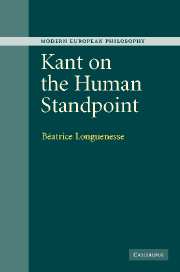Book contents
- Frontmatter
- Contents
- Acknowledgments
- Introduction
- PART I Revisiting the capacity to judge
- 1 Kant's categories, and the capacity to judge
- 2 Synthesis, logical forms, and the objects of our ordinary experience
- 3 Synthesis and givenness
- PART II The human standpoint in the Transcendental Analytic
- Part III The human standpoint in the critical system
- Bibliography
- Index of citations
- Index of subjects
1 - Kant's categories, and the capacity to judge
Published online by Cambridge University Press: 22 September 2009
- Frontmatter
- Contents
- Acknowledgments
- Introduction
- PART I Revisiting the capacity to judge
- 1 Kant's categories, and the capacity to judge
- 2 Synthesis, logical forms, and the objects of our ordinary experience
- 3 Synthesis and givenness
- PART II The human standpoint in the Transcendental Analytic
- Part III The human standpoint in the critical system
- Bibliography
- Index of citations
- Index of subjects
Summary
Both Sally Sedgwick and Henry Allison focus their comments on the central thesis of my book (KCJ): we should take more seriously than has generally been done Kant's claim that a “leading thread” can be found from some elementary logical forms of judgment to a system of categories, or “pure concepts of the understanding.” Both of them, however, express the worry that in stressing the role of the logical forms of judgment in Kant's argument not only in the Metaphysical Deduction of the Categories (Kant's argument for the derivation of the categories from logical forms of judgment) but also in the Transcendental Deduction (Kant's proof of the objective validity of the categories, or their a priori applicability to all objects of experience), I end up losing track of the categories themselves. “Where have all the categories gone?' ” asks Allison. And Sally Sedgwick: how is the idea that categories are “generated” compatible with Kant's insistence on their apriority? Given the close connection between their discussions, I shall not attempt to answer each of them separately. Rather, I shall weave my way from one to the other and back again, in considering two main issues: How should we understand the relationship between categories and logical forms of judgment? Do the categories end up playing no role at all in my account of the two main steps of the B Transcendental Deduction of the Categories?
- Type
- Chapter
- Information
- Kant on the Human Standpoint , pp. 17 - 38Publisher: Cambridge University PressPrint publication year: 2005
- 1
- Cited by



